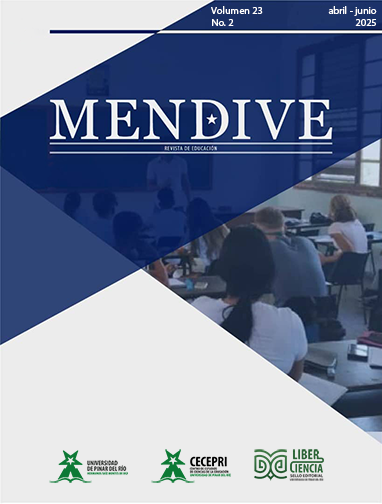General proposal for a teaching-learning process for educational robotics based on Cuban pedagogical foundations
Main Article Content
Abstract
The Ministry of Education and the leadership of the country have proposed incorporating robotics education into Cuban educational institutions due to its potential to foster a culture of science and technological innovation. In its scientific work, a Ministry of Education sectoral project identified recreational institutions and higher education extension projects that promote the learning of educational robotics among children and adolescents. However, due to the novelty of the subject in the country, there is still no didactic approach based on Cuban Pedagogical Sciences. The objective of this article is to disseminate the general proposal for the teaching-learning process for educational robotics based on Cuban pedagogical foundations, as formulated by the project researchers. The research was conducted through a qualitative study, employing theoretical methods such as analysis, synthesis, generalization, systematization, and documentary analysis to structure its conclusions. The empirical method used was the Delphi method, which uses the analysis of expert responses. The results showed the main similarities and differences between foreign and national didactic approaches. In addition, a general proposal for this process was presented regarding educational robotics in Cuba. The proposal was validated and refined using the Delphi Method for expert evaluation. Based on the results of the presented work, Cuba has a general proposal for a teaching-learning process for educational robotics, based on Cuban pedagogical sciences. Its implementation will provide a structured framework for the teaching-learning process of educational robotics.
Downloads
Article Details

This work is licensed under a Creative Commons Attribution-NonCommercial 4.0 International License.
References
Castro, A., Aguilera, C., & Chávez, D. (2022). Robótica educativa como herramienta para la enseñanza-aprendizaje de las matemáticas en la formación universitaria de profesores de educación básica en tiempos de COVID 19. Formación Universitaria, 15(2), 151-162. https://doi.org/10.4067/s0718-50062022000200151
Cuéllar, J., Hernández, W., Gutiérrez, M., & Vega, H. (2024). Tecnología para el aprendizaje: una reflexión desde la robótica educativa y stem en el desarrollo de competencias del siglo XXI. Revista Praxis, 20(3), 18. https://doi.org/10.21676/23897856.5864
Díaz Rivera, M. M., & Salas Álvarez, D. (2023). Fortalecimiento de competencias computacionales en estudiantes de la media académica utilizando Scratch Teknos Revista Científica, 23(1), 10-18. https://doi.org/10.25044/25392190.1058
González, M., Flores, Y., & Muñoz, C. (2020). panorama de la robótica educativa a favor del aprendizaje steam. Revista Eureka sobre enseñanza y divulgación de las ciencias, 18(2). https://doi.org/10.25267/rev-eureka-ensen-divulg-cienc.2021.v18.i.2.2301
Marín, A., Cano, J., & Mazo, A. (2023). Apropiación de la educación stem/steam en colombia: una revisión a la producción de trabajos de grado. Revista Científica, (47), 55-70. https://doi.org/10.14483/23448350.20473
Navarro, S. M., & Valle A. D. (2024). Tercer perfeccionamiento del sistema nacional de educación en Cuba. Gade: Revista Científica, 4(2), 78-88. https://revista.redgade.com/index.php/gade/article/view/420
Pincay M. A., & Cuero D. A. L. (2024). Innovación tecnológica educativa en la práctica docente para potenciar el proceso de enseñanza-aprendizaje. episteme koinonía. Episteme Koinonia, 7(13), 271-288. https://doi.org/10.35381/e.k.v7i13.3226
Recalde, E. M., Chicaiza, V., Guanga, U. R., & Bravo (2024). Importancia del aprendizaje basado en proyectos para el aprendizaje significativo. Ciencia Latina. Revista científica Multidisciplinar. 7(6): 7068-7081. https://doi.org/10.37811/cl_rcm.v7i6.9229
Remond Recio, Y. A., & Figueredo Rodríguez, R. M. (2020). Metodología de la enseñanza de la programación con scratch: una innovación disruptiva de las Tecnologías de la Información y la Comunicación (Tic) en la educación cubana. Serie Científica de la Universidad de las Ciencias Informáticas, 13(11), 104-118. https://publicaciones.uci.cu/index.php/serie/article/view/608
Rico, P., Santos, E., & Martín, V. (2004). Proceso de enseñanza aprendizaje desarrollador en la escuela primaria. Teoría y práctica. Editorial Pueblo y Educación.
Rosero, O. A. (2024). Fundamentos teóricos del uso de la robótica educativa. Ciencia Latina. Revista Multidisciplinar, 8(1). https://doi.org/10.37811/cl-rcm.v8i1.9979
Ruiz, D., & Ortega-Sánchez, D. (2022). El aprendizaje basado en proyectos: una revisión sistemática de la literatura (2015-2022). Revista Internacional de Humanidades, 11(monográfico), 1-14. https://doi.org/10.37467/revhuman.v11.4181
Sánchez M. D., & Prendes M. P. (2022). Investigar en tecnología educativa: un viaje desde los medios hasta las TIC. Hallazgos, 19(37), 299-328. https://doi.org/10.15332/2422409x.6325
Zambrano Briones, M. A., Hernández Díaz, A., & Mendoza Bravo, K. L. (2022). El aprendizaje basado en proyectos como estrategia didáctica. Conrado, 18(84), 172-182. http://scielo.sld.cu/scielo.php?script=sci_arttext&pid=S1990-86442022000100172&lng=es&tlng=es


